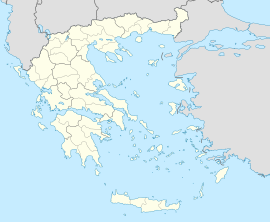Vigla (Greek: Βίγλα) is a settlement in Mount Athos. It is located at the southeastern edge of the Athos peninsula.[1]
Vigla
Βίγλα | |
|---|---|
Settlement | |
| Coordinates: 40°08′05″N 24°22′23″E / 40.1346977651°N 24.3731498822°E | |
| Country | Greece |
| Administrative region | Mount Athos |
| Elevation | 264 m (866 ft) |
| Time zone | UTC+2 (EET) |
| • Summer (DST) | UTC+3 (EEST) |
The settlement of Vigla on the southeastern tip of the Athonite peninsula is not to be confused with Megali Vigla, a 510 metre-high peak within the Mount Athos monastic territory that is less than 1.5 km from the border with Greece.[2]
Sites
editThe Skete of Prodromos, which belongs to the Great Lavra, is located in Vigla.[3]: 69
The Cave of St. Athanasius the Athonite is located on the cliffside of Vigla.[3]: 71 The cave was also where Saint Joseph the Hesychast (born Francis Kottis) took the name Joseph as he meditated there.[4]
The Cave of the Birth of Jesus is also located in the Vigla area. Osios Theodoros lived there as an ascetic and hermit.[3]: 71
References
edit- ^ "Βίγλα ΑΓΙΟ ΟΡΟΣ, Δήμος ΑΓΙΟ ΟΡΟΣ (Αυτοδιοίκητο)". buk.gr. Retrieved 2022-06-09.
- ^ Della Dora, Veronica (2016). Landscape, Nature, and the Sacred in Byzantium. Cambridge. p. 159. ISBN 978-1-316-48838-6. OCLC 938434170.
{{cite book}}: CS1 maint: location missing publisher (link) - ^ a b c Lilios, Loukas K. (2017). Mount Athos: Pilgrimage to "The Garden of Virgin Mary". Translated by Konstantina, Vlachoutsakou. Livadia: Lilios Publishers. ISBN 978-618-81848-6-2.
- ^ The Holy Elder Joseph the Hesychast, I.M. of Timios Prodromos Mesa Potamos, p. 23
